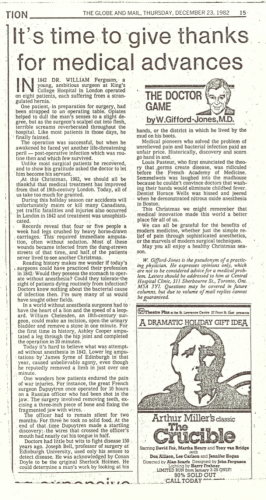It’s time to give thanks for medical advances
23 Dec 1982
IN 1842, DR. WILLIAM Ferguson, a young, ambitious surgeon at King’s College Hospital in London operated on eight patients, each suffering from a strangulated hernia.
One patient, in preparation for surgery, had been strapped to an operating table. Opiates helped to dull the man’s senses to a slight degree, but as the surgeon’s scalpel cut into flesh, terrible screams reverberated throughout the hospital. Like most patients in those days, he finally fainted.
The operation was successful, but when he awakened he faced yet another life-threatening peril — post-operative infection which was routine then and which few survived.
Unlike most surgical patients he recovered, and to show his gratitude asked the doctor to let him become his servant.
At this Christmas, 1982, we should all be thankful that medical treatment has improved from that of 19th century London. Today, all of us take too much for granted.
During this holiday season car accidents will unfortunately maim or kill many Canadians, yet traffic fatalities and injuries also occurred in London in 1842 and treatment was unsophisticated.
Records reveal that four or five people a week had legs crushed by heavy horse-drawn carriages. This required immediate arnputation, often without sedation. Most of these wounds became infected from the dung-strewn streets of that time, and half, of the patients never lived to see another Christmas.
Reading history makes me wonder if today’s surgeons could have practiced their profession in 1842. Would they possess the stomach to operate without anesthesia? Could they tolerate the sight of patients dying routinely from infection? Doctors knew nothing about the bacterial cause of infection then. I’m sure many of us would have sought other fields.
In a world without anesthesia surgeons had to have the heart of a lion and the speed of a leopard. William Chelesden, an 18th-century surgeon, could make an incision, open the urinary bladder and remove a stone in one minute. For the first time in history, Ashley Cooper amputated a leg through the hip joint and completed the operation in 20 minutes.
Today it’s hard to believe what was attempted without anesthesia in 1842. Lower leg amputations by James Syme of Edinburgh in that year caused unbelievable agony, even though he reputedly removed a limb in just over one minute.
One wonders how patients endured the pain of war injuries. For instance, the great French surgeon Dupuytren once operated for 10 hours on a Russian officer who had been shot in the jaw. The surgery involved removing teeth, excising a three-inch piece of bone and fixing the fragmented jaw with wires.
The officer had to remain silent for two months. For three he took no solid food. At the end of that time Dupuytren made a startling discovery: the wires that crossed the officer’s mouth had nearly cut his tongue in half.
Doctors had little but wits to fight disease 150 years ago. Joseph Bell, professor of surgery at Edinburgh University, used only his senses to detect. disease. He was acknowledged by Conan Doyle to be the original Sherlock Holmes. He could determine a man’s work by looking at his hands, or the district in which he lived by the mud on his boots.
Medical pioneers who solved the problem of unrelieved pain and bacterial infection paid an unfair price. Historically, discovery and scorn go hand in hand.
Louis Pasteur, who first enunciated the theory that germs create disease, was ridiculed before the French Academy of Medicine. Semmelweis was laughed Into the madhouse because he couldn’t convince doctors that washing their hands would eliminate childbed fever. Dentist Horace Wells was hissed and jeered when he demonstrated nitrous oxide anesthesia in Boston.
This Christmas we might remember that medical innovation made this world a better place for all of us.
We can all be grateful for the benefits of modern medicine, whether just the simple relief of pain through sophisticated anesthetics, or the marvels of modern surgical techniques. May you all enjoy a healthy Christmas season.



